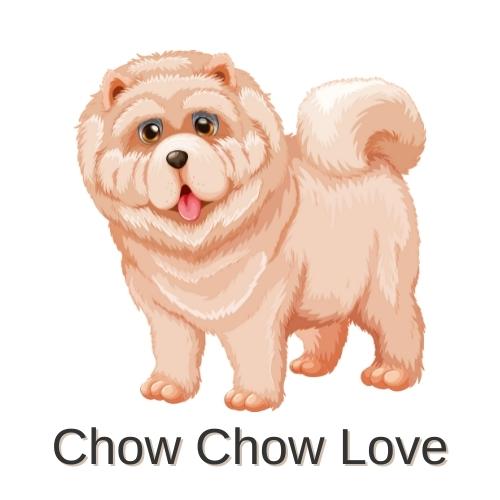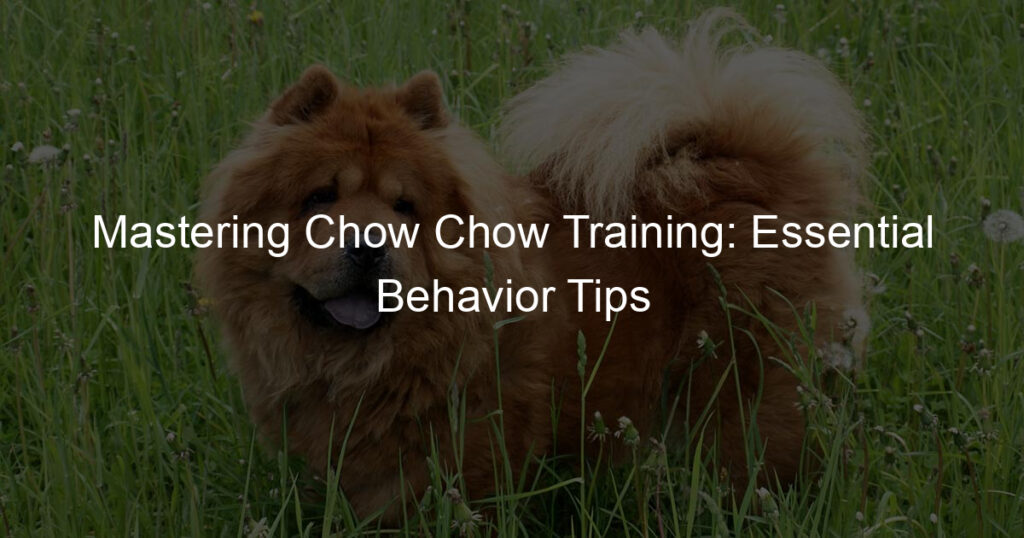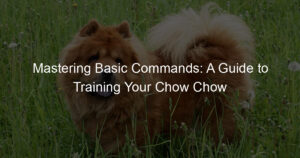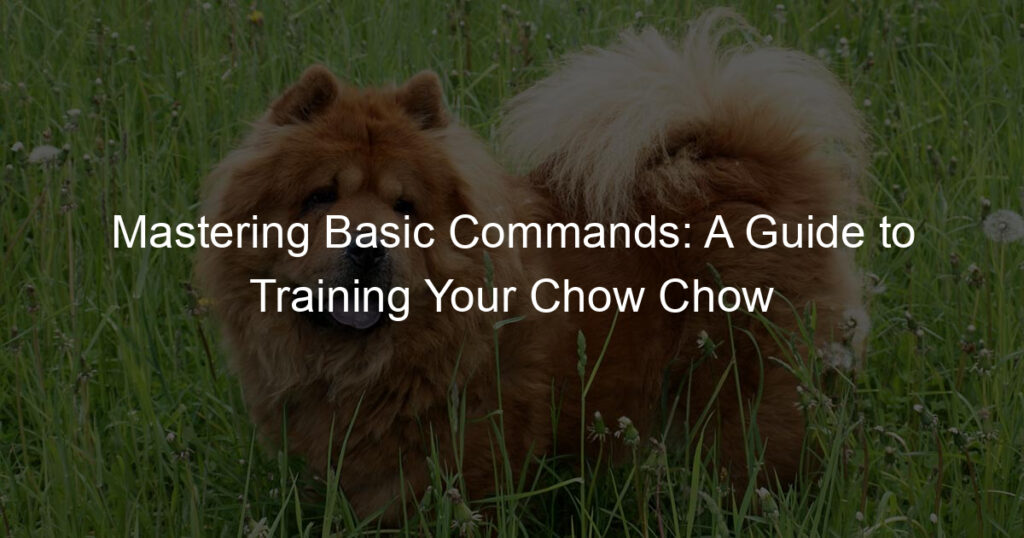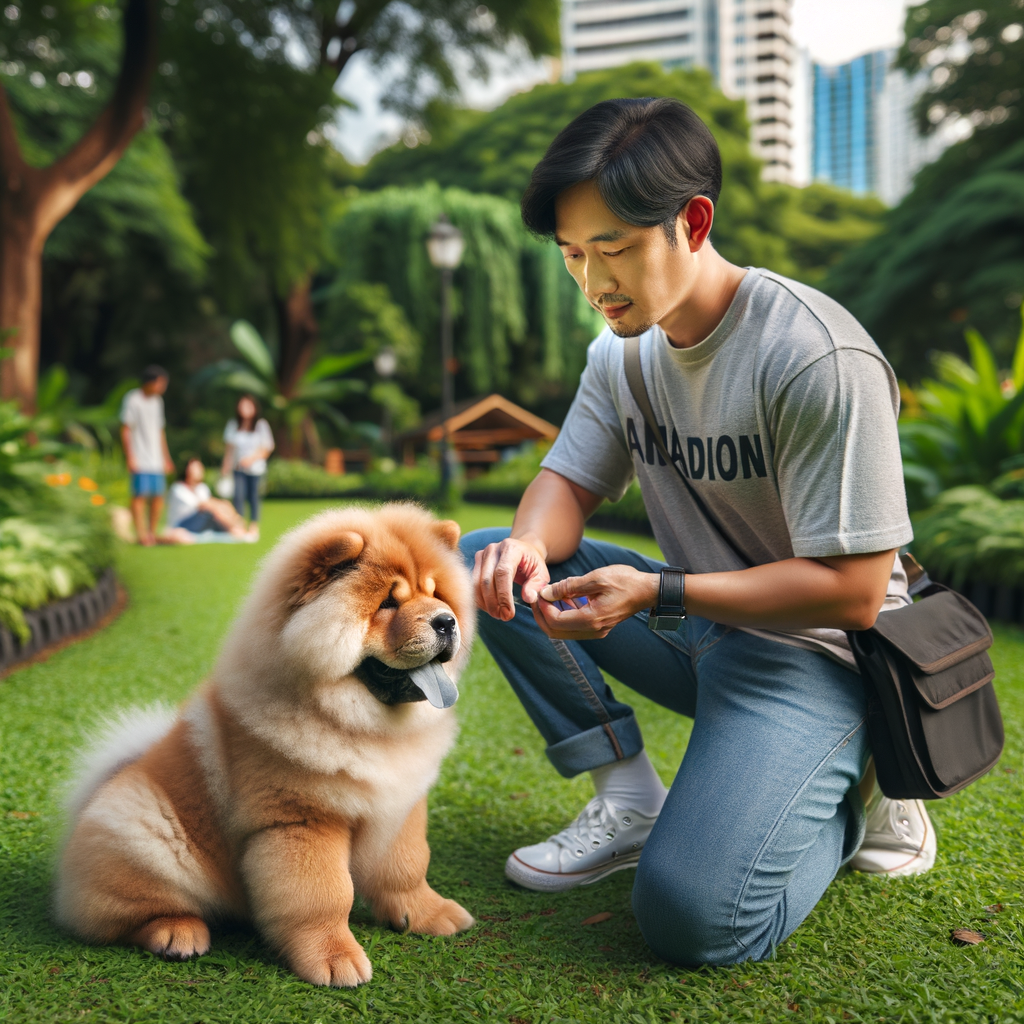
Introduction to Chow Chow Training
Welcome to the world of Chow Chow training! This post is designed to provide you with a comprehensive understanding of the importance of training your Chow Chow puppy and an overview of common behavior issues that you might encounter. Let’s dive in!
Training your Chow Chow puppy is not just about teaching them to sit or stay. It’s about shaping their behavior and ensuring they grow up to be well-mannered and obedient dogs. Training is essential for their safety and your peace of mind. It helps to establish a strong bond between you and your pet, and it also makes it easier for you to manage them in different situations. For example, a well-trained Chow Chow will respond to your commands, making it less likely for them to run off and get into trouble.
Chow Chows are known for their stubbornness and independence, which can sometimes lead to behavioral issues. Some common problems include aggression, excessive barking, and chewing. These issues can be a result of boredom, lack of exercise, or even anxiety. It’s important to understand these behaviors and address them through proper training and socialization. Remember, every Chow Chow is unique, and what works for one might not work for another. It’s all about understanding your pet and adapting your training methods to suit their needs.
In the following sections, we will delve deeper into understanding Chow Chow behavior, essentials of dog training, and specific Chow Chow training techniques. By the end of this post, you will be well-equipped to master Chow Chow training!
Understanding Chow Chow Behavior
When it comes to understanding the behavior of the Chow Chow breed, it’s important to remember that every dog is unique. However, there are certain characteristics and traits that are common among Chow Chows. Let’s delve into these to help you understand your furry friend better.
Chow Chow Breed Behavior
Chow Chows are known for their distinctive traits. They are often described as independent, aloof, and more cat-like than most dogs. But what does this mean in practical terms? Let’s explore.
-
- Insights into the unique characteristics of Chow Chow breed behavior
Chow Chows are typically reserved and dignified dogs. They are not overly active or playful, but they are extremely loyal and protective of their families. They tend to be wary of strangers and can be aggressive if they feel threatened. Chow Chows are also known for their stubbornness, which can make them a challenge to train.
-
- Case study: How understanding Chow Chow behavior can aid in training
Consider the case of Max, a Chow Chow who was initially seen as stubborn and untrainable. His owners were frustrated with his lack of response to traditional training methods. However, once they understood that Chow Chows respond better to positive reinforcement and patience, they were able to train Max successfully. They used rewards like treats and praises to encourage good behavior, and gave him time to understand and follow the commands. This case study highlights the importance of understanding the unique behavior traits of your Chow Chow to effectively train them.
In conclusion, understanding your Chow Chow’s behavior is key to building a strong, positive relationship with them. It can also make training more effective and enjoyable for both you and your dog. Remember, patience and understanding are key when dealing with this unique and wonderful breed.
Chow Chow Behavior Issues
Understanding the behavior of your Chow Chow is crucial for a harmonious living environment. In this section, we will delve into some common behavior issues, their causes, and how to manage them effectively.
-
- Identifying Common Chow Chow Behavior Issues
Chow Chows are known for their unique and sometimes challenging behaviors. Some of the most common issues include:
-
-
- Stubbornness: Chow Chows are known for their independent nature, which can sometimes be perceived as stubbornness.
- Aggression: If not properly socialized, Chow Chows can display aggression towards strangers or other animals.
- Destructive behavior: Boredom or lack of exercise can lead to destructive behavior such as chewing or digging.
-
Identifying these issues early can help in addressing them effectively.
-
- Understanding the Causes of These Issues
Understanding why your Chow Chow is behaving a certain way is the first step towards resolving the issue. Here are some common causes:
| Behavior Issue | Possible Cause |
|---|---|
| Stubbornness | Lack of proper training or socialization |
| Aggression | Fear, territorial instincts, or lack of socialization |
| Destructive behavior | Boredom, lack of exercise, or separation anxiety |
By understanding the root cause, you can tailor your approach to address the specific issue.
-
- Key Takeaways on Managing Chow Chow Behavior
Managing Chow Chow behavior requires patience, consistency, and understanding. Here are some key takeaways:
-
-
- Training: Start training your Chow Chow early and be consistent with your commands.
- Socialization: Expose your Chow Chow to different people, environments, and animals to reduce fear and aggression.
- Exercise: Regular exercise can help reduce destructive behavior by keeping your Chow Chow mentally and physically stimulated.
-
Remember, every Chow Chow is unique and what works for one may not work for another. It’s important to be patient and persistent in your efforts.
Essentials of Dog Training
Training your dog is a crucial part of pet ownership. It not only helps in managing your pet’s behavior but also strengthens the bond between you and your furry friend. In this section, we will focus on the essentials of dog training, specifically for the Chow Chow breed.
Chow Chow Obedience Training
Chow Chows are known for their stubborn and independent nature, making obedience training a vital part of their upbringing. Let’s delve into the importance of obedience training and some effective techniques for Chow Chows.
-
- Importance of obedience training in Chow Chows
Obedience training is essential for Chow Chows to ensure they grow into well-behaved and sociable dogs. This breed is known for its strong-willed nature, which can sometimes result in aggressive behavior if not properly trained. Obedience training helps curb these tendencies and promotes a healthy relationship between the dog and its owner. It also ensures the safety of both the dog and those around it.
-
- Effective techniques for Chow Chow obedience training
Training a Chow Chow requires patience and consistency. Here are some effective techniques:
-
- Positive Reinforcement: Reward your Chow Chow for good behavior. This can be in the form of treats, praises, or extra playtime. This encourages them to repeat the behavior.
- Consistency: Be consistent with your commands and the behavior you expect. This helps your dog understand what is expected of them.
- Early Socialization: Expose your Chow Chow to different environments, people, and other animals at a young age. This helps them become more comfortable and less aggressive in various situations.
Remember, every Chow Chow is unique and what works for one might not work for another. It’s important to be patient and persistent in your training efforts. With time and dedication, your Chow Chow will become a well-behaved and obedient companion.
Chow Chow Behavior Modification
Training a Chow Chow can be a challenging task due to their stubborn and independent nature. However, understanding their behavior and using the right modification techniques can make the process much easier and enjoyable for both the dog and the owner.
-
- Understanding the need for Chow Chow behavior modification
Chow Chows are known for their aloof and protective nature. While this can make them excellent watchdogs, it can also lead to aggressive or unruly behavior if not properly managed. This is where behavior modification comes into play. It’s not about changing the dog’s personality, but about teaching them how to behave appropriately in different situations.
Behavior modification can help in reducing unwanted behaviors like excessive barking, chewing, or aggression. It can also help in promoting positive behaviors like obedience and socialization. Understanding the need for behavior modification is the first step towards a well-behaved and happy Chow Chow.
-
- Examples of successful Chow Chow behavior modification techniques
There are several behavior modification techniques that can be successful with Chow Chows. Here are a few examples:
| Technique | Description |
|---|---|
| Positive Reinforcement | This technique involves rewarding the dog for good behavior. The reward can be a treat, praise, or a favorite toy. This encourages the dog to repeat the behavior. |
| Time-outs | If your Chow Chow exhibits aggressive or unwanted behavior, giving them a time-out can be effective. This involves removing the dog from the situation and giving them time to calm down. |
| Clicker Training | This is a type of positive reinforcement where a clicker is used to mark the desired behavior. Once the dog associates the clicker sound with a reward, it becomes a powerful tool for shaping behavior. |
Remember, every Chow Chow is unique, and what works for one may not work for another. It’s important to be patient and consistent in your training efforts. With time and dedication, you can successfully modify your Chow Chow’s behavior and enjoy a harmonious relationship with your furry friend.
Chow Chow Training Techniques
Training your Chow Chow can be a rewarding experience for both you and your furry friend. With the right techniques, you can help your Chow Chow become a well-behaved and obedient companion. Let’s dive into some practical tips that can make the training process easier and more effective.
Practical Chow Chow Training Tips
Training a Chow Chow requires patience, consistency, and understanding. Here are some practical tips that can help you train your Chow Chow effectively:
- Implementing effective Chow Chow training techniques: Start with basic commands like “sit”, “stay”, and “come”. Use positive reinforcement like treats, praises, or petting to reward your Chow Chow for good behavior. Remember, consistency is key. Repeat the training sessions daily and keep them short and fun.
- Practical tips for training Chow Chow puppies: Start training your Chow Chow puppy as early as possible. Puppies are more receptive to learning new things. Use a gentle, positive approach to training. Avoid harsh punishments as they can lead to fear and aggression. Instead, focus on rewarding good behavior. Socialization is also crucial for puppies. Expose your Chow Chow puppy to different environments, people, and other animals to help them become well-adjusted adults.
Training your Chow Chow doesn’t have to be a daunting task. With the right techniques and a lot of patience, you can help your furry friend become a well-behaved and obedient companion. Remember, every dog is unique, so what works for one Chow Chow might not work for another. Be patient, stay consistent, and most importantly, enjoy the process!
Advanced Training Techniques
When it comes to training your Chow Chow, there are several advanced techniques that can be highly effective. These methods are designed to help manage your dog’s behavior and ensure they become well-behaved and obedient members of your family.
- Exploring advanced techniques for managing Chow Chow behavior
One of the most effective advanced techniques for managing Chow Chow behavior is positive reinforcement. This method involves rewarding your dog for good behavior, which encourages them to repeat it. For example, if your Chow Chow sits on command, you might reward them with a treat or a pat on the head. This helps them associate the command with a positive outcome, making them more likely to obey in the future.
Another advanced technique is the use of clicker training. This involves using a small device that makes a distinct clicking sound. When your Chow Chow performs a desired behavior, you click the device and then reward them. Over time, your dog will associate the sound of the clicker with a reward, making them more likely to perform the behavior when they hear the click.
- Case study: Success stories of advanced Chow Chow training
There are many success stories of Chow Chow owners who have used these advanced training techniques to great effect. For example, one owner used positive reinforcement to train their Chow Chow to stop jumping up on guests. By rewarding their dog for staying on the ground when people entered the house, they were able to eliminate this unwanted behavior.
Another success story involves a Chow Chow who was trained using the clicker method. This dog was initially very stubborn and refused to obey commands. However, after the owner started using the clicker, the dog began to respond to commands more readily. This shows how effective these advanced techniques can be when used correctly.
| Training Technique | Example of Success |
|---|---|
| Positive Reinforcement | Chow Chow stopped jumping on guests |
| Clicker Training | Stubborn Chow Chow began obeying commands |
In conclusion, advanced training techniques can be highly effective for managing Chow Chow behavior. By using methods such as positive reinforcement and clicker training, you can help your dog become a well-behaved and obedient member of your family.
Conclusion: Mastering Chow Chow Training
As we reach the end of our journey into the world of Chow Chow training, it’s important to reflect on the key points we’ve covered. This will help you to solidify your understanding and ensure you’re well-equipped to handle your Chow Chow’s training needs.
-
- Recap of essential Chow Chow training tips
Firstly, we learned that understanding your Chow Chow’s behavior is the cornerstone of effective training. This breed is known for its independence and stubbornness, so it’s crucial to approach training with patience and consistency.
We also discussed the importance of positive reinforcement techniques. Rewarding your Chow Chow for good behavior, rather than punishing them for bad behavior, will yield the best results. Treats, praise, and playtime can all be effective rewards.
Lastly, we highlighted the need for socialization. Introducing your Chow Chow to a variety of people, animals, and environments will help them become a well-rounded and well-behaved pet.
-
- Final thoughts on understanding and managing Chow Chow behavior
Understanding your Chow Chow’s behavior is not just about training, it’s about building a strong and loving relationship with your pet. By understanding their needs and behaviors, you can provide them with a happy and fulfilling life.
Remember, every Chow Chow is unique. What works for one dog might not work for another. It’s important to be flexible and adapt your training methods to suit your individual dog’s personality and needs.
Mastering Chow Chow training may be a challenge, but the rewards are well worth the effort. With patience, consistency, and understanding, you can help your Chow Chow become a well-behaved and happy member of your family.
In conclusion, training a Chow Chow requires understanding, patience, and consistency. But with the right approach, you can build a strong bond with your pet and enjoy a rewarding and fulfilling relationship. Remember, the key to successful training is understanding your Chow Chow’s unique personality and needs. Happy training!
